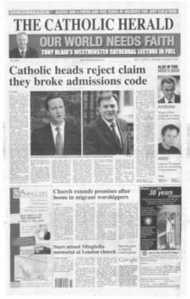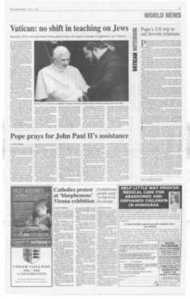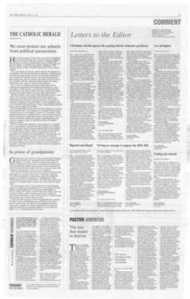Page 3, 11th April 2008
Page 3

Report an error
Noticed an error on this page?If you've noticed an error in this article please click here to report it.
Tags
Share
Related articles
By Simon Caldwell
Cardinal Urges Christians To Seek Dialogue With Atheists
Bishops Call For Peace As Us Prepares For Iraq War
`fight Trafficking With Zeal Of Wilberforce', Urges...
Cardinal Invites Uk Muslims To Fight For Religious Freedom
Tony Blair speaks of his passionate belief in faith
BY SIMON CALDWELL AND MARK GREAVES
FORMER British Prime Minister Tony Blair has spoken of his "passionate" conviction that religious faith can transform the future of humanity for the better.
Mr Blair, a former Anglican who was received into the Catholic Church just days before Christmas, said he wanted to promote the "idea of faith itself as something dynamic. modem and full of present relevance".
He told 1,600 people gathered in Westminster Cathedral that faith had a "major part to play in shaping the values which guide the modern world, and can and should be a force for progress".
"But it has to be rescued on the one hand from the extremist and exclusionary tendency within religion today; and on the other from the danger that religious faith is seen as an interesting part of history and tradition but with nothing to say about the contemporary human condition," he said. "I see faith and reason, faith and progreSS, as in alliance not contention?'
His remarks came in a lecture on the subject of "Faith and Globalisation", the first in a series of six speeches hosted by the Archdiocese of Westminster and sponsored by the Forte family, on "Faith and Life in Britain".
Mr Blair, now the Middle Fast peace envoy for the quartet of the US, the UN, the EU and Russia, said that many British people shared the notion that "religion is divisive, irrational and harmful".
"For years it was assumed that as humanity progressed intellectually and matured morally, so religion would decline." he said.
"But in fact at no time since the Enlightenment has religion ever gone away. It has always been at the very core of life for millions of people, the foundation of their existence. the motive for their behaviour, the thing which gives sense to their lives."
Faith is not in decline, he added, "it isn't disappearing inevitably under the weight of scientific and technological pmgress. It is still here with us, not just surviving but thriving".
He said that since leaving office as Prime Minister in June last year, he had become more acutely aware of the dynamics of globalisation, and he said that it was in this context that the role of faith was especially important.
He said that the world's religion could transform and humanise impersonal forces of globalisation, and shape the values of changing economic and political relationships of the early 21st century.
' He said that power was shifting rapidly from the West to the emerging superpowers of China and India, and the role of faith was vital in the struggle for a world of peaceful coexistence.
Mr Blair, 54, said the world "will be immeasurably poorer, more dangerous, more fragile and above all, more aimless" without a spiritual dimension.
"Today is more than ever when we need to discover and re-discover our essential humility before God, our dignity as found in our lives
being placed at the service of the source and goal of everything,he said.
"I can't prove that religious faith offers something more than humanism, but I believe profoundly that it does. And since religious faith has such a strong historical and cultural influence on both East and West, it can help unify around common values what otherwise might be a battle for domination."
He continued: "I am passionate about the importance of faith to our modern world and about the need for people of faith to reach out to one another."
Mr Blair said he would commit himself to the cause of interfaith dialogue through the Tony Blair Faith Foundation which he will set up in London in the summer.
He said he hoped the foundation would bring together different Christians, Muslims, Jews, Sikhs, Hindus and Buddhists in working to alleviate global poverty by urging governments to meet the Millennium Development Goals. These have the aim of halving the rates of world poverty defined by the numbers of people existing on less than a dollar day by 2015.
But he said the "broader objective" would be to help more people to realise religion as a "positive force for good".
Mr Blair said: "Faith is not a historical relic but a guide for humanity on its path to the future. A faithless world is not one in which we want ourselves and our children to live."
He concluded: "If people of different faiths can co-exist happily, in mutual respect and solidarity, so can our world."
When asked if he would have done anything differently in office he said: "There is nothing I look back on now and say that as a result of my religious journey I would have done things very differently, but that is expressly not to say that I got everything right."
Mr Blair has also accepted a post at Yale University where later this year he will give seminars on "faith and globalisation", in which he will focus on how religion can be used to further international relations.
Cardinal Corrnac MurphyO'Connor thanked Mr Blair for a "marvellous, moving and, in the circumstances, very brave lecture".
While Mr Blair was speaking, hundreds of protesters from the Stop the War Coalition group. who held him responsible for taking Britain into war in Iraq, tried to drown out his words with a "wall of sound".
They used musical instruments, whistles, pans and alarms to make as much noise as possible. Some stood beneath the windows of the Cathedral and howled at the top of their voices. On the piazza, a punk band played for more than an hour.
Fax Christi UK. the Catholic peace movement, held a silent prayer vigil outside the cathedral before the lecture, with some of its members dressed in sackcloth and ashes and holding up banners quoting remarks made by Benedict XVI and John Paul II against war.
Stewart Hemsley, chairman
of Pax Christi, said: "We've organised the vigil because we are very unhappy that Mr Blair should be preaching from the pulpit of Westminster Cathedral when he hasn't shown any sign of repentance for going to war in Iraq illegally.
"He has brought horror and devastation to that country and we think it would have been appropriate if he had at least expressed sorrow and sadness and that needs to be done publicly because the act of going to war was a very public act.
"If I was in his tthe Cardinal's] place 1 would want to know that Mr Blair had expressed his sorrow and admitted that he was wrong in taking the decision to go to war especially because the late John Paul II had made it abundandy clear that war was not the answer.
"I think it would have been
more appropriate for the cardinal to follow John Paul [I's lead in this matter. The domestic Church in this country was strangely quiet on this issue and did not follow the lead given by Pope John Paul and the Vatican."
Also there was Norman Kernber, a Christian peace activist held hostage for four months in Iraq.
He said: "I'm still very concerned about the continuing plight of the people of Iraq. I feel that Mr Blair was partly responsible for their current situation. We should remind him that it's about time he repented of his error.
"I think the action was so un-Christian that I don't think he should have been invited to the Cathedral. I'm happy for him to come to confession in the Cathedral but not to give a sermon."
Sister Susan Clarkson, 61, from the Oxford Catholic Worker, said: "I took part in the silent vigil with Pax Christi because I believe that it was ill-advised of the Cardinal to invite Tony Blair here today.
"I think the Church is sending the wrong message out to the country. I don't believe in war in any kind. It makes me very sad about the message that the Catholic Church in this country is giving out.
"I think he should acknowledge that he led us into an illegal war.
"In the early Church when people became Christian if they had been involved in war-making before they had to repent of that publicly."
Pro-life organisations were equally vexed at Mr Blair's appearance.
John Smeaton of the Society for the Protection of Unborn Children reacted by writing to Mr Blair the next day to ask him if he now repudiated abortion, something he
voted for continually while an MP. Dr Helen Watt, the director of the Linacre Centre for Healthcare Ethics, a Catholic bioethical institute, said: "It's important to promote real development, rather than simply impose failed western solutions on people in the developing world.
"Tony Blair should use his influence to ensure that be Millennium Goals are not used to justify unethical practices or human rights abuses.
"For example, maternal deaths should be combated by improving access to lifeaffirming healthcare, and never by sterilising or aborting women in vulnerable situations.
"Catholics and others particularly those in positions of authority should be vigilant and vocal in opposing such damaging 'solutions',"
Full text of speech: Pagel)
blog comments powered by Disqus

















